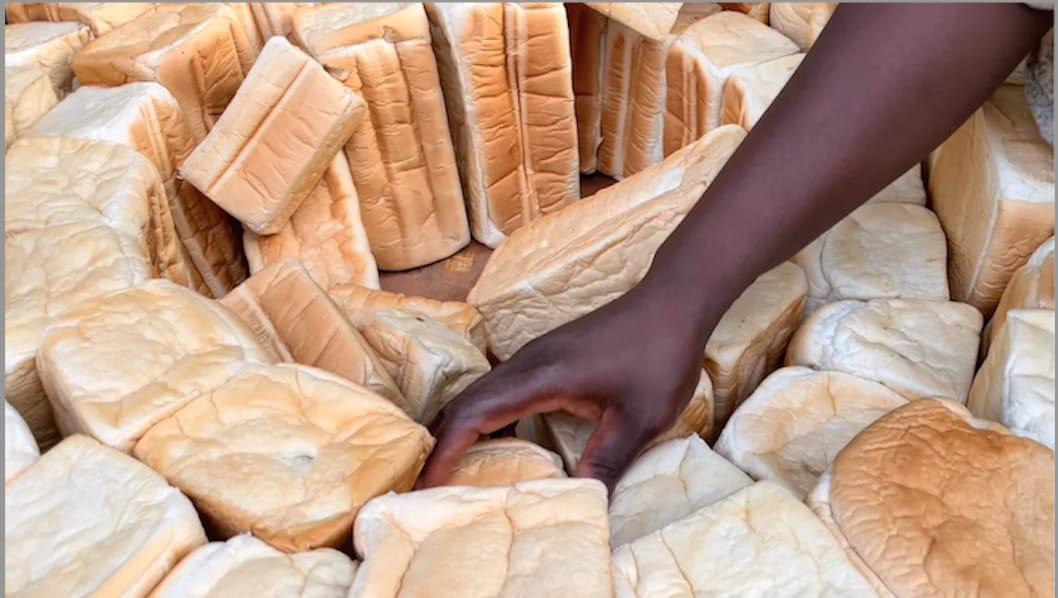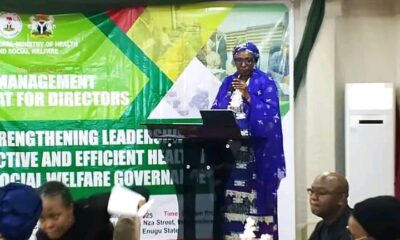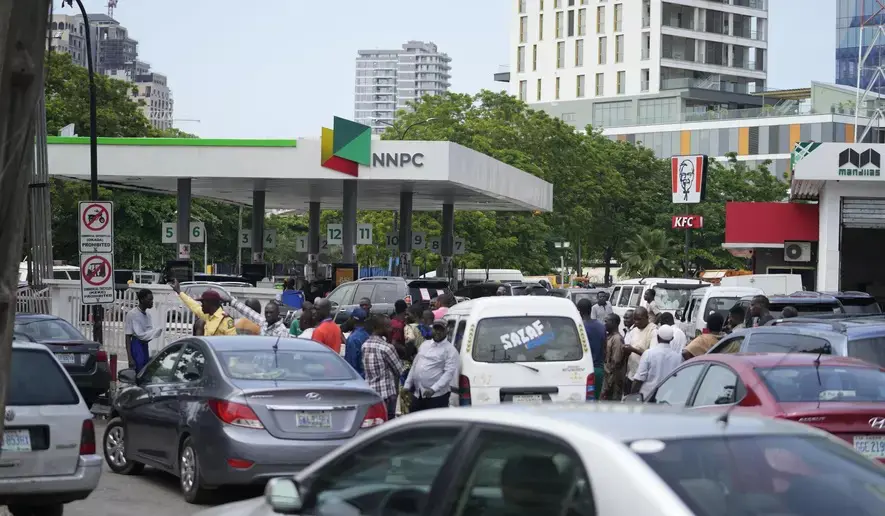Business
Bread Production: Bakers Demand Price Reduction On Flour And Other Ingredients
Published
8 months agoon
By
Ekwutos Blog
Bakers have called for a reduction in flour prices and urgent government intervention to address skyrocketing costs affecting their operations.
The Association of Master Bakers and Caterers of Nigeria has called on the Federal Government to intervene on the incessant increase in the prices of flour despite recent approval of duty-free importation waiver on wheat and maize.
The association therefore called on government to probe the activities of Flour Milling Association of Nigeria and sugar producers for causing the increases in the prices of bread.
The Chairman of the Association in Lagos State, Chief Matthew Ayoola and General Secretary, Abraham Alabi, who raised the observations during a press conference, proposed a reduction in the prices of wheat, flour and other ingredients used by bakers for smooth operation.
The event had as its theme, “Call For The Federal Government’s Urgent Intervention On The Incessant Increase Of Flour Prices Despite Recent Approval Of Duty-Free Importation Waiver On Wheat, Maize, Others.”
The text reads, “The record holds that Master Bakers and Caterers in Nigeria are the second largest employer of labour in Nigeria. This means that bakers’ shutdown of bakeries might pollute the society
“We sincerely appreciate the federal government of Nigeria upon the approval of a 150-day duty-free window to allow the importation of wheat, maize, and husked brown rice as part of measures to combat rising food inflation across the country effective August 1, 2024. However, the Nigeria Millers are yet to implement this on the price of their commodities.
“We are using this medium to call on the Federal Government to intervene in the operations of the Flour Milling Association of Nigeria (FMAN) as they are a major factor causing incessant increases in the price of wheat which falls to the high price of buying bread. It seems they intend to siphon money and milk the majority of Nigerians to live in abject poverty. Their current incessant increase of flour and sugar prices despite Government actions to ameliorate the cost of food items is a sabotage to the economy. The millers are taking advantage of government assistance to enrich themselves and make the good citizens starve.
“It’s imperative to note that in July the Federal Government of Nigeria announced the approval of a 150-day duty-free window to allow the importation of wheat, maize, and husked brown rice as part of measures to alleviate rising food inflation across the country. The government’s notable action should be to help bring down the prices of food items in the market, making some food items more accessible and affordable for the masses.
“However, our findings revealed some Millers chose to sell wheat to neighboring countries and some of them chose to ignore this waiver and instead continue to inflate the price of flour on a daily basis. This action has not only disregarded the Federal Government’s efforts to alleviate the suffering of Nigerians but also a severe blow to our industry. It’s a way of robbing innocent Nigerians. The millers did not consider our call for price reduction but rather advised us to inflate the price of bread more to inflict pain on the common man, which is an inhumane action to take.
“This constant increase in the price of flour by millers has made it impossible for Bakeries to operate and function smoothly which has also led to the shutdown of many bakeries and their staff being laid off. Lives are at stake when basic needs are scarce. Nigerians complain on a daily basis due to a lack of basic needs for survival and bread is one of them. The flour Millers are mounting pressure on human beings unnecessarily. Today, the price of flour has increased by 67,000 naira as against the last ten years’ price of 8,000.
“As flour is experiencing an increase so also are sugar, yeast, wheat, butter, nylon, and other ingredients needed, in fact, everything we use for production has increased. All the millers have declined our proposal for reduction of the cost of flour.
“We therefore call on the Federal Government to investigate the activities of the millers and sugar producers assess them and force them to do the needful because it seems they are more focused on making exorbitant and excess profits while they put the country at risk and chaos.
We appeal to the Ministry of Industry, trade, and Investment for urgent intervention in this matter.
“The smooth operations of bakers across the country are at risk due to the unjust practices of millers. Bakers need help to assist the masses cushion the effect of hunger in the land. Everything keeps increasing except workers’ income. Bread is common to Nigerians. It has an impact on both bakers and purchasers and there is a need for reduction of flour, wheat, and other materials. The inflating cost of bread saddens our hearts unfortunately the millers’ actions pose a greater challenge to us. For the public to experience adequate reduction of food items, the price of wheat must be reduced.
“Wheat is typically milled into flour which is then used to make a wide range of foods including bread, crumpets, muffins, noodles, pasta, biscuits, cakes, pastries, cereal bars, sweet and savory snack foods, crackers, crisp bread, sauces and confectionery (e.g. licorice).
“We request the Federal government to enforce the implementation of the waiver from the point of importation to the consumers for proper monitoring. The government should meet with the Millers on possible solutions to curb the incessant increase in the cost of flour and wheat. There should be a reduction in prices of wheat, flour, and other ingredients bakers use for smooth operations.
“We propose a reduced price range of between N30,000 and N40,000 per bag. To avoid a shutdown of bakers, the government’s 150-day duty-free window should reflect on the prices at which bakers purchase production commodities which would automatically reflect on the price at which Nigerians purchase breads and other consumables.
“We also demand a surplus in the distribution/accessibility of commodities to bakers. We also urged the Federal Government to take decisive actions to ensure that the waivers on wheat importations are enforced and that the millers comply with the intended purpose of reducing the cost of flour and wheat. The Federal government waiver should reflect the cost of food items bought.”
How much is better bread sold in your area?
Here’s N1,500 and above
Please leave a comment let’s talk about it.
You may like


ALAUSA FLAGS OFF SBMC-SIP AND TEACHER DEVELOPMENT INITIATIVES TO REVITALISE BASIC EDUCATION.


2025 RETREAT FOR HEALTH DIRECTORS’: PS URGES DIRECTORS’ TO UPHOLD TENETS OF EFFECTIVE SERVICE DELIVERY & SUCCESSION PLANNING


HOUSING MINISTRY LAUNCHES MAIDEN EDITION OF SERVICE CHARTER *Service Charter a symbol of new beginning- Minister Dangiwa


CHALLENGES OF TERRORISM REQUIRES HOLISTIC AND MULTIFACETED APPROACH- SENATOR GAIDAM


FG GIVES UPDATE ON THE CRUDE AND REFINED PRODUCT SALES IN NAIRA INITIATIVE


Ukraine seeks to reassure Brussels by drawing red lines on US minerals deal
Business
FCCPC Urges Nigerians to Report Harassing Loan Apps and Businesses
Published
3 days agoon
April 7, 2025By
Ekwutos Blog
The Federal Competition and Consumer Protection Commission (FCCPC) is advising Nigerians to report any loan apps or businesses that engage in harassing behavior over unpaid loans.
According to the FCCPC, no consumer should live in fear of harassment or intimidation.
Ekwutosblog gathered that Consumers can file complaints with the FCCPC through their website or contact their customer service hotline.
The FCCPC is responsible for protecting consumer rights and promoting fair competition in Nigeria.
FCCPC has taken steps to regulate digital money lenders and enforce consumer protection laws, including fining Meta and WhatsApp $220 million for violating the Federal Competition and Consumer Protection Act (FCCPA) and the Nigeria Data Protection Regulation (NDPR)
To file a complaint, follow these steps
Visit the FCCPC website and fill out the complaint form. Provide detailed information about the harassment, including dates, times, and communication records. Submit supporting documents, such as screenshots or messages. FCCPC Website: https://fccpc.gov.ng/ Customer Service Hotline: 0805 600 2020, 0805 600 3030
Email: mailto:contact@fccpc.gov.ng
Business
Chief Vincent Obianodo is the Founder of Young Shall Grow Group, a leading transportation company in Nigeria.
Published
3 days agoon
April 7, 2025By
Ekwutos Blog
Chief Vincent was Born in Neni, Anambra State, He spent his early life in his hometown after which he moved to Kano state where He learnt how to fix punctured tyres (vulcanizer), and became perfect at it (a time when few people could do it), because of it he had a lot of customers queuing for his vulcanizing services.
He did the job for more few years before he decided to go into the transportation business as a bus conductor. He continued the bus conductor job until 1972 when he had gathered enough money to buy his bus. After acquiring maximum knowledge on how the transportation business works, he then decided to stop working as a bus conductor and he acquired a mini-bus to ply the Enugu to Onitsha route.
In 1973 he relocated his business operations from Onitsha to Lagos and ventured into a more developed transport business, which he started with two locally built Mercedes Benz 911 buses. After seven years of operating in Lagos, the number of buses he owned increased from 2 to 40 alongside his transport business. He also engaged in the delivery of goods which also boosted the success of his business.
His exceptional customer service delivery got many people to patronize his business and by 1978, he decided to expand by opening up a new interstate route, plying from Lagos to Onitsha to Owerri. He also bought a Mercedes Benz 0362 luxury bus for this purpose. This expansion gained his business more fame and within 6 years, his number of buses grew to 150. Owing to the success of the business, Chief Vincent Incorporated his business in 1984 so he could fully cover every possible part of Nigeria, as a leading inter-state luxury bus company.
Today, The Young Shall Grow Motors is one of the largest luxury bus companies in Nigeria with over 500 buses that ply almost every route in Nigeria as well as other west African countries like Ghana, Burkina Faso, Mali and The Benin Republic.
He also has businesses in the Hospitality, Oil and Gas, Real estate sectors.
From Vulcanizer to millionaire in dollars, today his net worth is over 300 million dollars.
Business
Dangote refinery, NNPC: More fuel stations increase pump price in Nigeria
Published
5 days agoon
April 4, 2025By
Ekwutos Blog
The price of Premium Motor Spirit, popularly known as fuel, has recorded a significant increase in the past days, which may worsen the economic hardship Nigerians face.
MRS, a filling station partner of Dangote Refinery, kicked off the latest fuel price increase when it adjusted its petrol pump to between N925 and N950 per litre in Lagos and the Federal Capital Territory, Abuja.
Similarly, other fuel marketers such as Empire Energy, Recoil, Juda Oil, Total, Emedab, and others also increased their fuel pump to between N950 and N970 per litre.
On Wednesday, the Nigerian National Petroleum Company Limited retail outlets also jacked up their fuel price to N950 per litre from N880 in Abuja.
Summarily, Ekwutosblog observed motorists will have to pay N70 more to buy a litre of petrol in the coming days.
The development comes amid the suspension of petrol product sales in Naira by Dangote Refinery. This follows the initiation of the naira-for-crude sale deal between Dangote Refinery and the federal government through NNPCL.
On Wednesday, President Bola Ahmed Tinubu announced a reshuffling of NNPCL.
Meanwhile, local oil prices are increasing in Nigeria, despite the decline in global crude prices. As of the time of this report, United States West Texas Intermediate was at $62.15 per barrel, down from above $65, while Brent crude stood at $65.42 per barrel, down from $72 last week.

ALAUSA FLAGS OFF SBMC-SIP AND TEACHER DEVELOPMENT INITIATIVES TO REVITALISE BASIC EDUCATION.

2025 RETREAT FOR HEALTH DIRECTORS’: PS URGES DIRECTORS’ TO UPHOLD TENETS OF EFFECTIVE SERVICE DELIVERY & SUCCESSION PLANNING

HOUSING MINISTRY LAUNCHES MAIDEN EDITION OF SERVICE CHARTER *Service Charter a symbol of new beginning- Minister Dangiwa
Trending

 Trending6 months ago
Trending6 months agoNYA demands release of ‘abducted’ Imo chairman, preaches good governance
- Business6 months ago
US court acquits Air Peace boss, slams Mayfield $4000 fine

 Politics6 months ago
Politics6 months agoMexico’s new president causes concern just weeks before the US elections
- Entertainment6 months ago
Bobrisky transferred from Immigration to FCID, spends night behind bars
- Entertainment6 months ago
Bobrisky falls ill in police custody, rushed to hospital

 Politics6 months ago
Politics6 months agoRussia bans imports of agro-products from Kazakhstan after refusal to join BRICS

 Politics6 months ago
Politics6 months agoPutin invites 20 world leaders
- Politics1 year ago
Nigerian Senate passes Bill seeking the establishment of the South East Development Commission.

